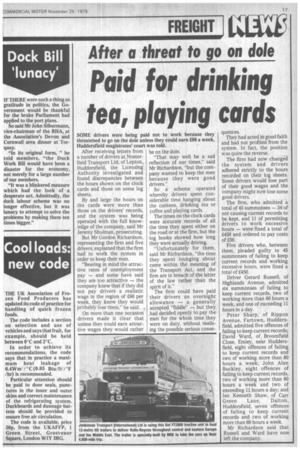After a threat to go on dole
Page 19

If you've noticed an error in this article please click here to report it so we can fix it.
Paid for drinking tea, playing cards
SOME drivers were being paid not to work because they threatened to go on the dole unless they could earn £80 a week, Huddersfield magistrates' court was told.
After receiving letters from a number of drivers at Nosterfield Transport Ltd, of Lepton, Huddersfield, the Licensing' Authority investigated and found discrepancies between the hours shown on the clock cards and those on some log sheets.
By and large the hours on the cards were more than those on the drivers' records, and the system was being operated with the full knowledge of the company, said Mr Jeremy Shulman, prosecuting.
But Mr Gordon Richardson, representing the firm and five drivers, explained that the firm had to work the system in order to keep their men.
"Bearing in mind the attractive rates of unemployment pay — and some have said they are too attractive — the company knew that if they did not pay drivers a realistic wage in the region of £80 per week, they knew they would probably lose them," he said. .
On more than one occasion drivers made it clear that unless they could earn attractive wages they would rather be on the dole.
"That may well be a sad reflection of our times," said Mr Richardson, "but the company wanted to keep the men because they were good drivers."
So a scheme operated whereby drivers spent considerable time hanging about the canteen, drinking tea or coffee and playing cards.
The times on the clock cards were accurate records of all the time they spent either on the road or at the firm, but the log books showed how long they were actually driving.
"Unfortunately for them, said Mr Richardson, "the time they spent lounging about came within the meaning of the Transport Act, and the firm are in breach of the letter of the law rather than the spirit of it." The firm could have paid their drivers an overnight allowance — a generally accepted "fiddle" — but they had decided openly to pay the men for the whole time they were on duty, without realising the possible serious conse quences.
They had acted in good faith and had not profited from the system. In fact, the position was quite the reverse.
The firm had now changed the system and drivers adhered strictly to the hours recorded on their log sheets. Some drivers would lose part of their good wages and the company might now lose some good drivers.
The firm, who admitted a total of 45 summonses — 34 of not causing current records to be kept, and 11 of permitting drivers to work excessive hours — were fined a total of £450 and ordered to pay costs of £50.
Five drivers who, between them, pleaded guilty to 45 summonses of failing to keep current records and working excessive hours, were fined a total of £450.
Driver Gerard Russell, of Highlands Avenue, admitted six summonses of failing to keep current records, two of working more than 60 hours a week, and one of exceeding 11 hours in a day.
Peter Sharp, of Rippon Avenue, Fartown, Huddersfield, admitted five offences of failing to keep current records; David Ward, of1 Broomfield Close, Emley, near Huddersfield, eight offences of failing to keep current records and two of working more than 60 hours a week; John Alan Buckley, eight offences of failing to keep current records, two of working more than 60 hours a week and two of exceeding 11 hours a day; and Ian Kenneth Shaw, of Carr Green Lane, Dalton, Huddersfield, seven offences of failing to keep current records and two of working more than 60 hours a week.
Mr Richardson said that Russell and Ward have now left the company.








































































































